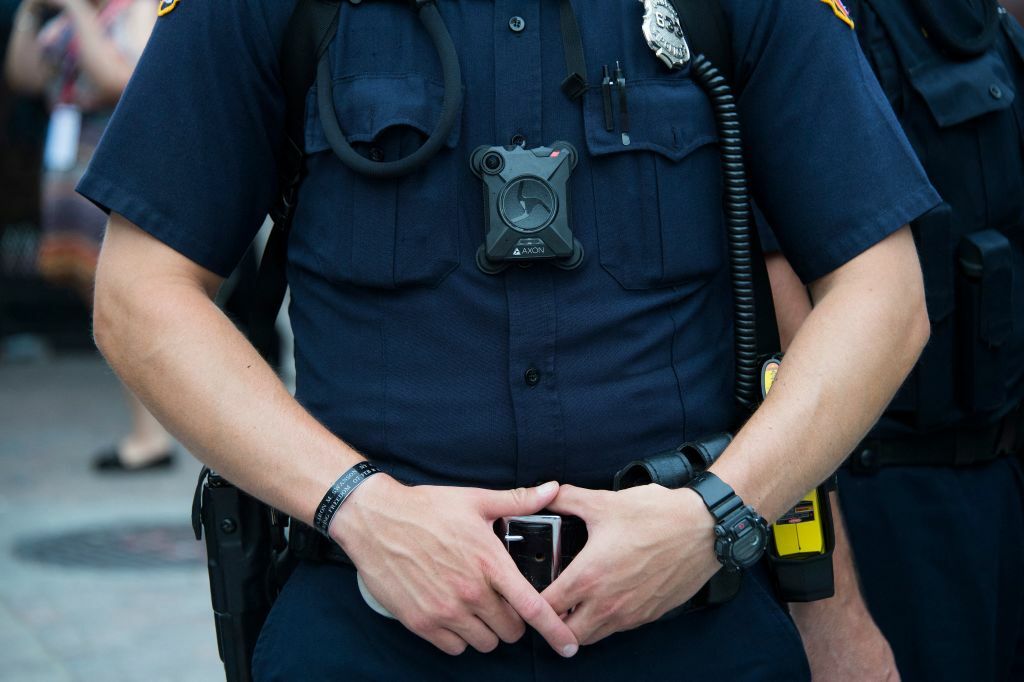
Ohio Governor Mike DeWine has officially turned police body camera footage into a commodity.

Source: JIM WATSON/AFP via Getty Images / Getty
According to PEOPLE, DeWine signed H.B. 315 into law late Thursday night, allowing law enforcement agencies to charge up to $750 per request for bodycam, dashcam, and jail surveillance footage—records that were previously a key tool for holding officers accountable.
That’s literally someone’s check. Imagine a simple traffic violation turned for the worse, and now it costs your savings to retrieve the proof.
It’s not right.
As reported by WEWS News 5 Cleveland, the legislation permits agencies to charge up to $75 per hour for processing video footage.
What kind of law takes steps away from transparency and accountability?
Ohio police are defending the controversial law as a necessary move to prevent harassment from frivolous requests. In WEWS News 5 Cleveland, Mike Weinman of the Fraternal Order of Police states:
“What we really want to do is protect people, protect the officers, and cut down on all these requests that we’re getting that people are making money off of.”
The platform also spoke with Marion Police Chief Jay McDonald as he explained the strain frequent requests put on departments:
“Processing that body cam footage takes hours of work, and it really makes the job harder for media, lawyers, and citizens who are asking for requests,” said McDonald.
According to Weinman, smaller municipalities often lack the staffing to handle such requests, making the law a resource-saving measure.
There is absolutely no fairness of charging taxpayers twice for access to footage they already fund.
Advocates and legal experts argue the law unfairly burdens everyday citizens, especially those seeking justice. In WEWS News 5 Cleveland, Attorney Sarah Gelsomino stressed how financially unfair this would affect local.
“Everyday average citizens who have interactions with police, who maybe have some concern about that, who want to seek accountability — they’re the ones who aren’t gonna be able to get access to these records because of these financial restrictions.”
Gelsomino also summarized the impact: “This hurts the people who need the video the most.”
As reported by WEWS News 5 Cleveland, constitutional law professor Jonathan Entin also criticized the law, calling it “a universal punishment” for the actions of a few.
“If you raise the price of something, you will lower the demand,” Entin stated. “Fewer people will ask for bodycam videos, even though… some videos shows that the story the government initially told wasn’t accurate. Making it more expensive strikes me as a step in the wrong direction.”
The process of passing the law took 17 hours. In WEWS News 5 Cleveland, it was noted that H.B. 315 was signed with many lawmakers unaware of its provisions before voting. Governor DeWine signed the 450-page omnibus bill near midnight without public hearings. Entin criticized the process.
“Adopting something at 1 or 2 a.m., literally on the last day of the legislature, does not indicate thoughtfulness,” said DeWine.
WEWS News 5 Cleveland states that cities like Cleveland and Akron are reviewing how to implement the law, with Cleveland stating that it will waive fees for traditional media outlets.
Tyler Sinclair, a spokesperson for Cleveland, encourages others to use their platforms to spread awareness of the unjust treatment.
“Freedom of the press is a cornerstone of democracy, and we strongly believe in the crucial role the traditional media has in holding the government accountable,” said Sinclair.
Use your voices.
Truthfully, this law only benefits one side…how is that fair? Police brutality continues to rise despite footage or social media awareness. Now, the government has decided to tax and charge to get access to evidence.
Who is to say that marginalized and underrepresented communities of color who are disproportionately given financial opportunities, as well as treated with genuine respect by law enforcement, will be able to even afford it?
Ohioans have about 90 days before the law goes into effect, and whether it faces public or legal challenges remains to be seen.
The post Ohio’s New Law Sparks Debate: Are Police Bodycams Behind A Paywall? appeared first on Bossip.

